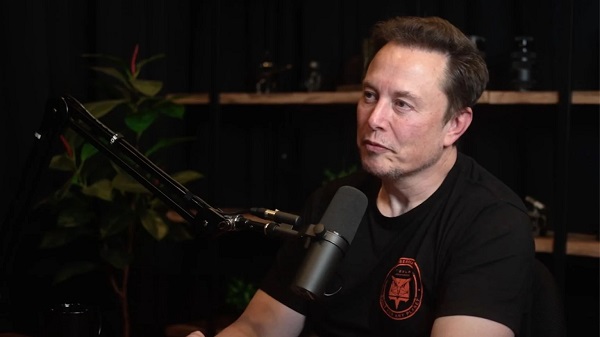Internet
Elon Musk Announces Algorithm Overhaul for X, Focusing on “Unregretted User-Seconds”

Musk’s algorithm overhaul introduces vague metrics that could reshape discourse under the guise of user satisfaction.
If you’re tired of censorship and surveillance, subscribe to Reclaim The Net
|
|
Censorship Industrial Complex
Welcome to Britain, Where Critical WhatsApp Messages Are a Police Matter

By
“It was just unfathomable to me that things had escalated to this degree,”
“We’d never used abusive or threatening language, even in private.”
|
You’d think that in Britain, the worst thing that could happen to you after sending a few critical WhatsApp messages would be a passive-aggressive reply or, at most, a snooty whisper campaign. What you probably wouldn’t expect is to have six police officers show up on your doorstep like they’re hunting down a cartel. But that’s precisely what happened to Maxie Allen and Rosalind Levine — two parents whose great offense was asking some mildly inconvenient questions about how their daughter’s school planned to replace its retiring principal.
This is not an episode of Black Mirror. This is Borehamwood, Hertfordshire, 2025. And the parents in question—Maxie Allen, a Times Radio producer, and Rosalind Levine, 46, a mother of two—had the gall to inquire, via WhatsApp no less, whether Cowley Hill Primary School was being entirely above board in appointing a new principal.
What happened next should make everyone in Britain pause and consider just how overreaching their government has become. Because in the time it takes to send a meme about the school’s bake sale, you too could be staring down the barrel of a “malicious communications” charge.
The trouble started in May, shortly after the school’s principal retired. Instead of the usual round of polite emails, clumsy PowerPoints, and dreary Q&A sessions, there was… silence. Maxie Allen, who had once served as a school governor—so presumably knows his way around a budget meeting—asked the unthinkable: when was the recruitment process going to be opened up?
A fair question, right? Not in Borehamwood, apparently. The school responded not with answers, but with a sort of preemptive nuclear strike.
Jackie Spriggs, the chair of governors, issued a public warning about “inflammatory and defamatory” social media posts and hinted at disciplinary action for those who dared to cause “disharmony.” One imagines this word being uttered in the tone of a Bond villain stroking a white cat.
|
 |
Parents Allen and Levine were questioned by police over their WhatsApp messages. |
|
For the crime of “casting aspersions,” Allen and Levine were promptly banned from the school premises. That meant no parents’ evening, no Christmas concert, no chance to speak face-to-face about the specific needs of their daughter Sascha, who—just to add to the bleakness of it all—has epilepsy and is registered disabled.
So what do you do when the school shuts its doors in your face? You send emails. Lots of them. You try to get answers. And if that fails, you might—just might—vent a little on WhatsApp.
But apparently, that was enough to earn the label of harassers. Not in the figurative, overly sensitive, “Karen’s upset again” sense. No, this was the actual, legal, possibly-prison kind of harassment.
Then came January 29. Rosalind was at home sorting toys for charity—presumably a heinous act in today’s climate—when she opened the door to what can only be described as a low-budget reboot of Line of Duty. Six officers. Two cars. A van. All to arrest two middle-aged parents whose biggest vice appears to be stubborn curiosity.
“I saw six police officers standing there,” she said. “My first thought was that Sascha was dead.”
Instead, it was the prelude to an 11-hour ordeal in a police cell. Eleven hours. That’s enough time to commit actual crimes, be tried, be sentenced, and still get home in time for MasterChef.
Allen called the experience “dystopian,” and, for once, the word isn’t hyperbole. “It was just unfathomable to me that things had escalated to this degree,” he said. “We’d never used abusive or threatening language, even in private.”
Worse still, they were never even told which communications were being investigated. It’s like being detained by police for “vibes.”
One of the many delightful ironies here is that the school accused them of causing a “nuisance on school property,” despite the fact that neither of them had set foot on said property in six months.
Now, in the school’s defense—such as it is—they claim they went to the police because the sheer volume of correspondence and social media posts had become “upsetting.” Which raises an important question: when did being “upsetting” become a police matter?
What we’re witnessing is not a breakdown in communication, but a full-blown bureaucratic tantrum. Instead of engaging with concerned parents, Cowley Hill’s leadership took the nuclear option: drag them out in cuffs and let the police deal with it.
Hertfordshire Constabulary, apparently mistaking Borehamwood for Basra, decided this was a perfectly normal use of resources. “The number of officers was necessary,” said a spokesman, “to secure electronic devices and care for children at the address.”
Right. Nothing says “childcare” like watching your mom get led away in handcuffs while your toddler hides in the corner, traumatized.
After five weeks—five weeks of real police time, in a country where burglaries are basically a form of inheritance transfer—the whole thing was quietly dropped. Insufficient evidence. No charges. Not even a slap on the wrist.
So here we are. A story about a couple who dared to question how a public school was run, and ended up locked in a cell, banned from the school play, and smeared with criminal accusations for trying to advocate for their disabled child.
This is Britain in 2025. A place where public institutions behave like paranoid cults and the police are deployed like private security firms for anyone with a bruised ego. All while the rest of the population is left wondering how many other WhatsApp groups are one message away from a dawn raid.
Because if this is what happens when you ask a few inconvenient questions, what’s next? Fingerprinting people for liking the wrong Facebook post? Tactical units sent in for sarcastic TripAdvisor reviews?
It’s a warning. Ask the wrong question, speak out of turn, and you too may get a visit from half the local police force.
|
|
|
|
Reclaim The Net values your free speech and privacy. Each issue we publish is a commitment to defend these critical rights, providing insights and actionable information to protect and promote liberty in the digital age.
Despite our wide readership, less than 0.2% of our readers contribute financially. With your support, we can do more than just continue; we can amplify voices that are often suppressed and spread the word about the urgent issues of censorship and surveillance. Consider making a modest donation — just $5, or whatever amount you can afford. Your contribution will empower us to reach more people, educate them about these pressing issues, and engage them in our collective cause. Thank you for considering a contribution. Each donation not only supports our operations but also strengthens our efforts to challenge injustices and advocate for those who cannot speak out. Thank you.
|
Business
Vice President Vance expects framework of TikTok deal by April 5

 MxM News
MxM News
Quick Hit:
Vice President JD Vance expects a framework agreement to resolve TikTok’s ownership by April 5, as the Biden-era law requiring its Chinese owner, ByteDance, to sell the app or face a ban looms. President Donald Trump had previously delayed enforcement of the law, allowing more time for negotiations. The White House is in discussions with multiple potential buyers to establish an American-owned version of the social media platform.
Key Details:
-
Vice President Vance stated that a high-level agreement will likely be reached that meets national security concerns while creating a U.S.-based TikTok enterprise.
-
President Trump signed an executive order in January, delaying the enforcement of a law requiring ByteDance to sell TikTok or face a ban.
-
The White House is engaged with four interested groups in potential acquisition talks.
Diving Deeper:
The fate of TikTok in the U.S. has been a subject of intense debate due to concerns over data security and its ties to the Chinese Communist Party through ByteDance. The law, originally passed under the Biden administration, sought to force the sale of the app due to fears that American user data could be accessed by the Chinese government. However, after taking office, President Trump extended the enforcement deadline by 75 days, giving room for negotiations.
Vice President Vance, speaking to NBC News aboard Air Force Two, expressed confidence that an agreement will be reached by April 5, though some details may still need to be finalized afterward. He and national security adviser Michael Waltz have been leading efforts to facilitate a sale that would address national security concerns while preserving TikTok’s massive American user base.
President Trump revealed last weekend that his administration is in talks with four different groups interested in acquiring the app. While the specifics of these negotiations remain undisclosed, the administration has made it clear that TikTok must operate as a distinct American entity to remain in the U.S. market.
As the deadline approaches, ByteDance has not publicly commented on the ongoing discussions. However, with bipartisan concerns over the influence of the Chinese Communist Party on U.S. technology platforms, the expectation is that any deal will include significant safeguards to prevent foreign interference in the app’s operations.
The coming weeks will determine whether a sale materializes or if further action will be needed to enforce the law. Either way, the Trump administration has signaled its commitment to ensuring that TikTok is no longer under the control of a hostile foreign adversary.
-

 2025 Federal Election2 days ago
2025 Federal Election2 days agoPoilievre To Create ‘Canada First’ National Energy Corridor
-

 2025 Federal Election2 days ago
2025 Federal Election2 days agoJoe Tay Says He Contacted RCMP for Protection, Demands Carney Fire MP Over “Bounty” Remark
-

 Daily Caller24 hours ago
Daily Caller24 hours agoBiden Administration Was Secretly More Involved In Ukraine Than It Let On, Investigation Reveals
-

 2025 Federal Election2 days ago
2025 Federal Election2 days agoChinese Election Interference – NDP reaction to bounty on Conservative candidate
-

 2025 Federal Election2 days ago
2025 Federal Election2 days agoHong Kong-Canadian Groups Demand PM Carney Drop Liberal Candidate Over “Bounty” Remark Supporting CCP Repression
-

 Business1 day ago
Business1 day agoBiden’s Greenhouse Gas ‘Greendoggle’ Slush Fund Is Unraveling
-

 Business24 hours ago
Business24 hours agoTrump says ‘nicer,’ ‘kinder’ tariffs will generate federal revenue
-

 2025 Federal Election2 days ago
2025 Federal Election2 days agoChina Election Interference – Parties Received Security Briefing Days Ago as SITE Monitors Threats to Conservative Candidate Joe Tay











